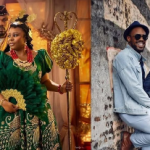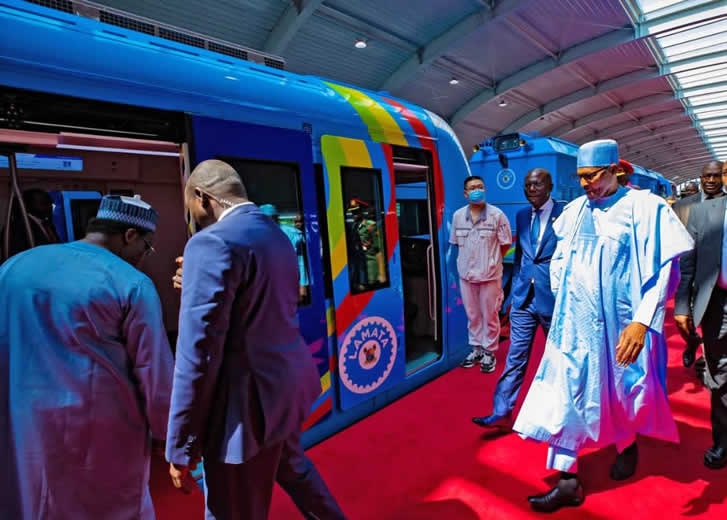The President, Major General Muhammadu Buhari (retd.) has officially launched the Blue Rail Line which is targeted to transport 7.5 million residents of Lagos State monthly.
The President inaugurated the project and also the John Randle Centre for Yoruba Culture and History on Tuesday, at the climax of his two-day visit to Lagos State, accompanied by the Lagos State Governor, Mr Babajide Sanwo-Olu, his deputy, Dr Obafemi Hamzat, and other important dignitaries.
At the event, Buhari also supervised the signing of a contract by the governor for the commencement of the project’s second phase, which will cover a 14-kilometre stretch from Mile 2 to Okokomaiko.
According to the statement issued by the Chief Press Secretary to the Governor, Mr Gboyega Akosile, the rail infrastructure constructed by the Lagos Metropolitan Transport Authority, will transport 250,000 passengers daily and the ongoing construction on the Red Line, which extends 37km from Agbado to Ebute Metta, will be completed before the end of May.
In his address at the event, Sanwo-Olu said, “Mr President, this line that you are about to commission and take a ride in, is 13km long, and the first phase of a 27km line.
“This Phase one runs from Marina to Mile 2, across five stations: Marina, National Theatre, Iganmu, Alaba, and Orile, and is expected to cover that distance in less than 15 minutes, compared with the rush-hour time of 2.5 hours if undertaken by road.
“The benefits are obvious, and unquantifiable: a more efficient transport service that improves the quality of life of Lagosians frees up more of their time, reduces the pressure on the roads, and contributes to Nigeria’s lofty climate action obligations.
“This iconic Marina station that is hosting us today will be the largest and busiest train hub in Africa, with a capacity to process as many as 400 passengers per minute, translating into 24,000 passengers every hour.
“When phase one starts running fully, we envisage that it will transport a quarter of a million Lagosians daily, rising to half a million daily when the entire corridor is completed.”
The President also rode on the electric-powered train as it made a round trip between the Marina station and National Theatre.
Also speaking at the event, Hamzat noted that the Strategic Transport Master Plan which laid out the foundation for a network of robust and modern transport infrastructure was laid out by the presidential candidate of the All Progressives Congress, Asiwaju Bola Tinubu.
“The master plan has six rail lines and one monorail, 14 Bus Rapid Transit corridors, over 20 water routes and a number of major roads.
“Central to the implementation of the transport master plan is the Lagos Metropolitan Area Transport Authority, which was established in 2002 by Asiwaju Tinubu to develop an effective intermodal transport system for Lagosians,” he said.
Earlier, Buhari also visited the John Randle Centre in Lekki which had been reconstructed since 2018 to serve as a hub for cultural tourism, recreation and entertainment.
The centre has an exhibition gallery, which chronicles the history of Yoruba, its cultural evolution and its journey from the race’s origins, through the present day, to the future.
Sanwo-Olu explained that the centre fitted into the state’s overall objectives in arts, culture and tourism as stipulated in the recently launched 20-year Arts and Tourism master plan which will make Lagos a tourism destination.
On her part, the state Commissioner for Tourism, Arts and Culture, Mrs Uzamat Akinbile-Yussuf, described the inauguration as a landmark achievement made by the Sanwo-Olu administration in the area of tourism, arts and culture.
“I must also stress that apart from this centre being a museum that will stimulate the local economy of the state by bringing tourists from within and outside the country, it is a multi-faceted and all-encompassing tourism asset that portrays the indigenous culture of not only Lagosians but the entire Yoruba race.
“It is indeed a centre that creates avenues for younger generations to have first in-depth knowledge about our culture that is nearly going into extinction, so it is a knowledge sharing centre,” she said.
Source: The Punch








